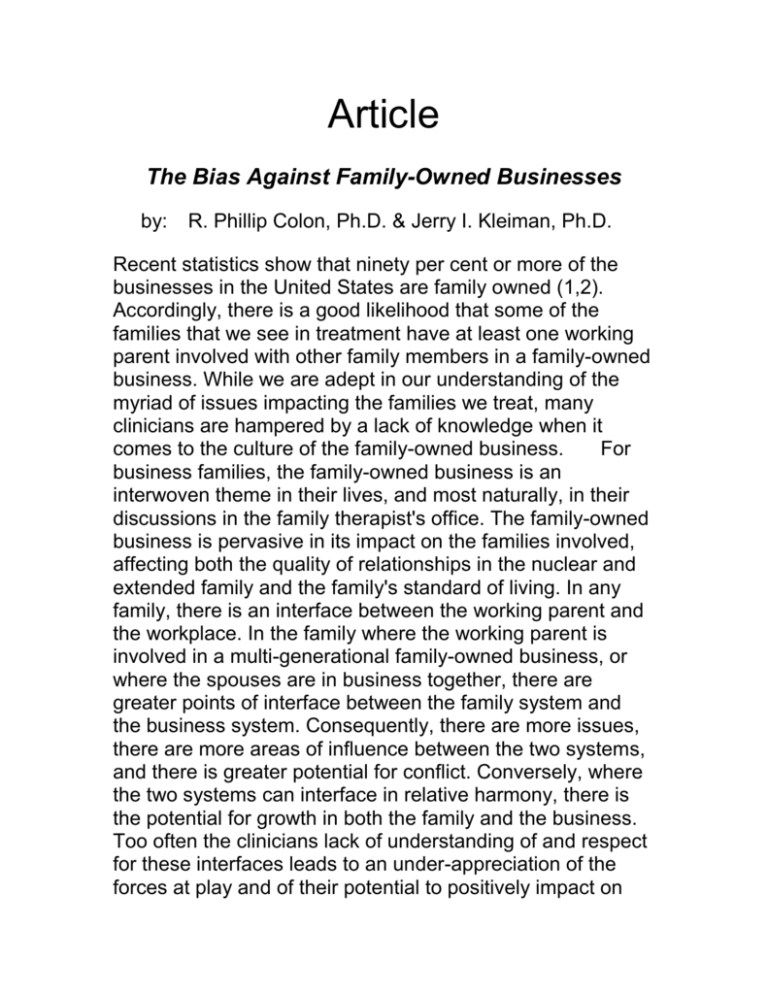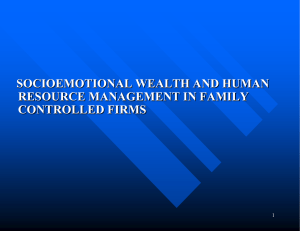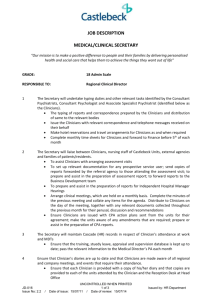The Bias Against Family-Owned Businesses
advertisement

Article The Bias Against Family-Owned Businesses by: R. Phillip Colon, Ph.D. & Jerry I. Kleiman, Ph.D. Recent statistics show that ninety per cent or more of the businesses in the United States are family owned (1,2). Accordingly, there is a good likelihood that some of the families that we see in treatment have at least one working parent involved with other family members in a family-owned business. While we are adept in our understanding of the myriad of issues impacting the families we treat, many clinicians are hampered by a lack of knowledge when it comes to the culture of the family-owned business. For business families, the family-owned business is an interwoven theme in their lives, and most naturally, in their discussions in the family therapist's office. The family-owned business is pervasive in its impact on the families involved, affecting both the quality of relationships in the nuclear and extended family and the family's standard of living. In any family, there is an interface between the working parent and the workplace. In the family where the working parent is involved in a multi-generational family-owned business, or where the spouses are in business together, there are greater points of interface between the family system and the business system. Consequently, there are more issues, there are more areas of influence between the two systems, and there is greater potential for conflict. Conversely, where the two systems can interface in relative harmony, there is the potential for growth in both the family and the business. Too often the clinicians lack of understanding of and respect for these interfaces leads to an under-appreciation of the forces at play and of their potential to positively impact on both the family and business. A survey of psychotherapists was conducted by the authors. Psychotherapists of various disciplines (Ph.D.s and C.S.W.s) were provided with two clinical vignettes that differed only in the fact that in one vignette, the father was involved in a stressful family-owned business; in the other, the father was involved in a stressful non-family owned business. A third vignette depicted a well functioning family, with no identifiable conflicts, and with the father involved in a family-owned business. The results showed that in the first two vignettes, the majority of respondents attributed the business to be a major contributor to the problems at home, but only when the parent was involved in a family-owned business. Autonomy and individuation issues were identified as existing mainly for those involved in a family-owned business. When given the third scenario where there were no problems identified, respondents still subscribed problems of autonomy and individuation just by the casual mention of the parent's involvement in a family-owned business. This bias, the view that many of the issues confronting the family and working parent in a family-owned business are inherently pathological, can have a negative effect in the treatment of the family. The clinician's bias may influence and even encourage the working parent to leave the family-owned business rather than attempt to work out the issues at hand. Successful development of the parent involved in the familyowned business may mean attempting to resolve boundary issues, learning to negotiate across boundaries, and learning how to deal with issues of autonomy, competency, rivalry between family members and other issues of contention. The family-owned business is often made the scapegoat for developmental lags in these areas. A parallel can be drawn between working with ethnic groups and working with business families. Differences in cultural experience and norms between a clinician and an ethnic group can lead a family therapist to pathologize what in the ethnic culture is normal. Similarly, clinicians who lack an understanding and appreciation of the culture of the family-owned business risk the danger of pathologizing what is normal. Without the proper understanding of the family-owned business culture, the clinician may be at odds with interpersonal dynamics that are not appreciated and may miss the opportunity to help the client-family. Certainly, there are times where the interface between the family and the family-owned business lead to issues that are not resolvable, and where the working parent must give consideration to dissolving or leaving the familyowned business. Nevertheless, it behooves the family therapist to respect the potential for optimal personal and business growth that the interface between family and business allows. Our research suggests that clinicians tend to be biased about an individual's involvement in familyowned businesses and that there is a need for clinicians to develop a greater awareness of the culture of the familyowned business. As there are more areas of interface between the working parent, workplace and the family when there is involvement in a family-owned business, there is a greater chance of family conflict and more of a tendency on the part of the clinician to view participation in the familyowned business a priori as the cause of the conflict. We found that clinicians tended to view people involved in a family-owned business as less relationally evolved than those that are not. There is a need for awareness and openness on the part of the professional in recognizing that the family and business can positively interface with and enhance family life. As clinicians, we need to confront our bias that involvement in a family-owned business is inherently pathological. References: 1. Astrachan, Joseph and Carey, Melissa (1994). Family Businesses In The U.S. Economy. Unpublished manuscript from presentation to The Center For The Study Of Taxation. 2. Lank, Alden G. (1994). The State of Family Business in Various Countries Around the World. FBN Newsletter, May 1994, No. 9. Reprinted from "The Family Psychologist," Spring, 1995








